Key Takeaways
- Caffeine blocks adenosine to keep you alert, but when it wears off, built-up adenosine can cause the classic crash in energy, focus, and mood.
- High or poorly timed doses can lead to jitters, anxiety, headaches, sleep disruption, and a cycle of dependence on ever more caffeine.
- Using smaller, smarter doses combined with balancing nutrients is a better way to enjoy caffeine’s benefits while minimizing downsides.
- Performance Lab® Caffeine 2™ pairs natural caffeine with L-theanine, L-tyrosine, and NutriGenesis® B-vitamins for smoother stimulation and healthier cognitive recovery.
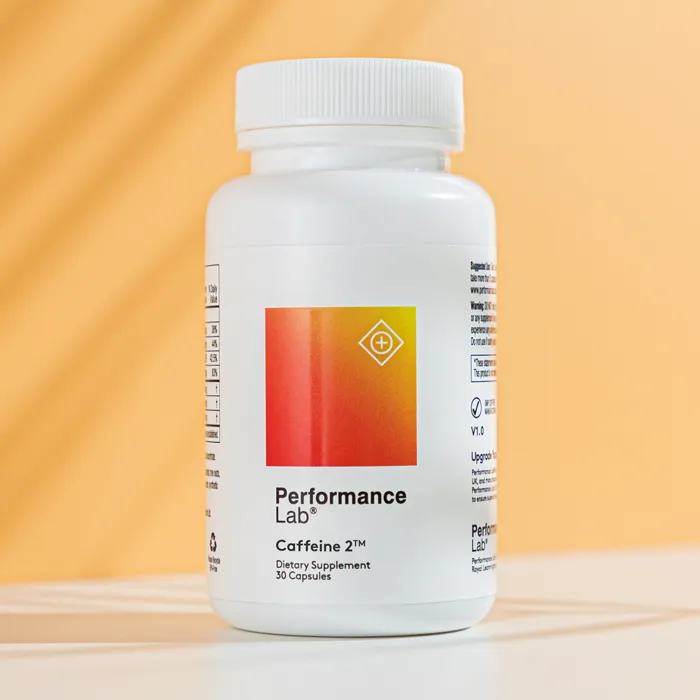
Morning rituals
Your alarm goes off. Still groggy and not yet ready to admit it's morning, you hit snooze. Your alarm goes off again. Ok, ok, you're coming round to the idea but just 10 more minutes. Third time's a charm. Your alarm goes off. You need to get up.
The only way to start the day? Coffee.
It's estimated that 90% of the adult population consumes caffeine on a daily basis. In the U.K that's around 95 million cups per day. In the U.S., that's 400 million.
We are a world united in our love of caffeine.
In fact, we've been hooked on it for at least 5,000 years.
According to legend, Emperor Shen Nung, hailed as the father of Chinese medicine, discovered tea when leaves from a wild tree blew into his pot of boiling water. Being an herbalist and scientist at heart, he thought, "Why not?" And decided to try the infusion. Apparently, he found it quite refreshing.
From all of us, thank you Shen Nung.
Whether it's the comforting aroma of a fresh pot of coffee or grabbing our favorite blend at the coffee shop on the corner. It's part of our daily ritual. And we're all probably a little bit more addicted to caffeine than we'd like to admit.
Caffeine. It's the world's most popular psycho active substance.
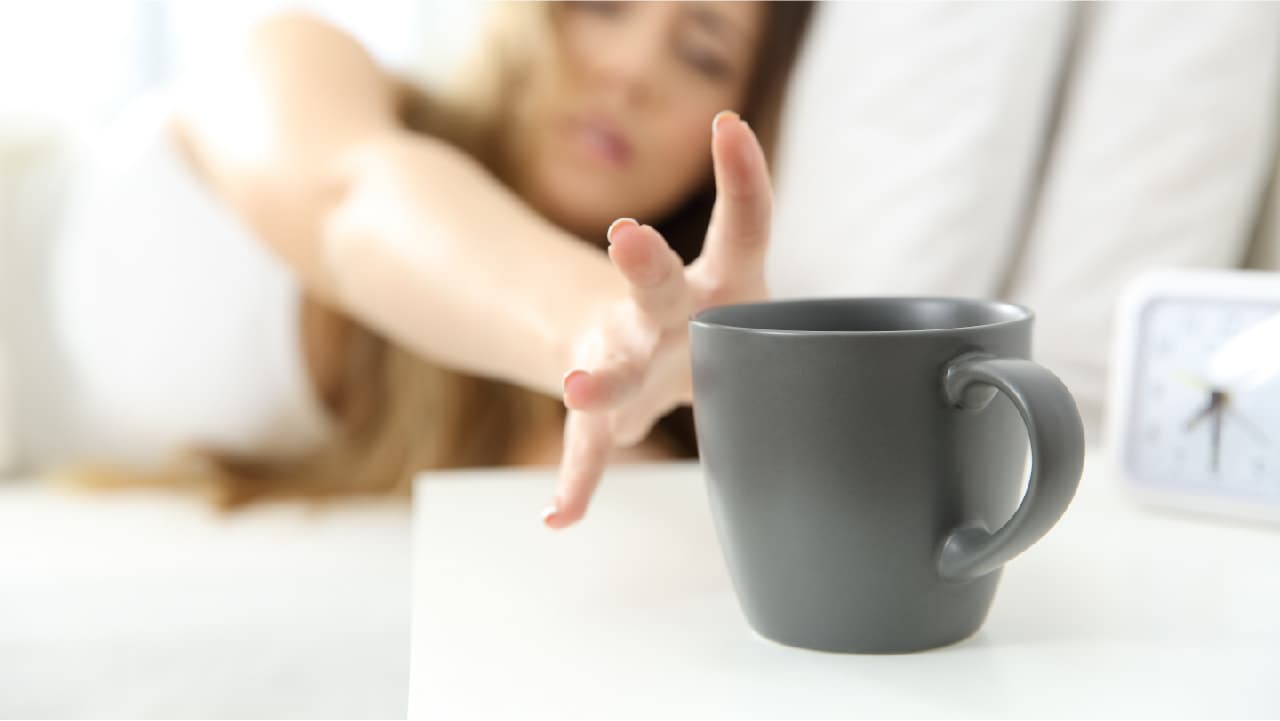
And like any other drug, there's a dependency cycle that pulls us back in. Reaching for that first cup of tea or coffee in the morning always hits the spot. But is that feel-good factor down to coffee kickstarting a productive day? Or is it just suppressing the symptoms of withdrawal that started creeping in whilst we were sleeping?
Could the reason we're all reaching for caffeine first thing, be down to the effect yesterday's caffeine had on our sleep quality. And instead of each sip propelling us forward, is it just helping us to catch up?
Are we trapped in a relentless cycle of borrowing energy?
In this piece we'll look at how caffeine helps us physically and cognitively. Why some people can tolerate more than others. And how we can make caffeine work for us, without having to give up our only vice.
What does caffeine do for us?
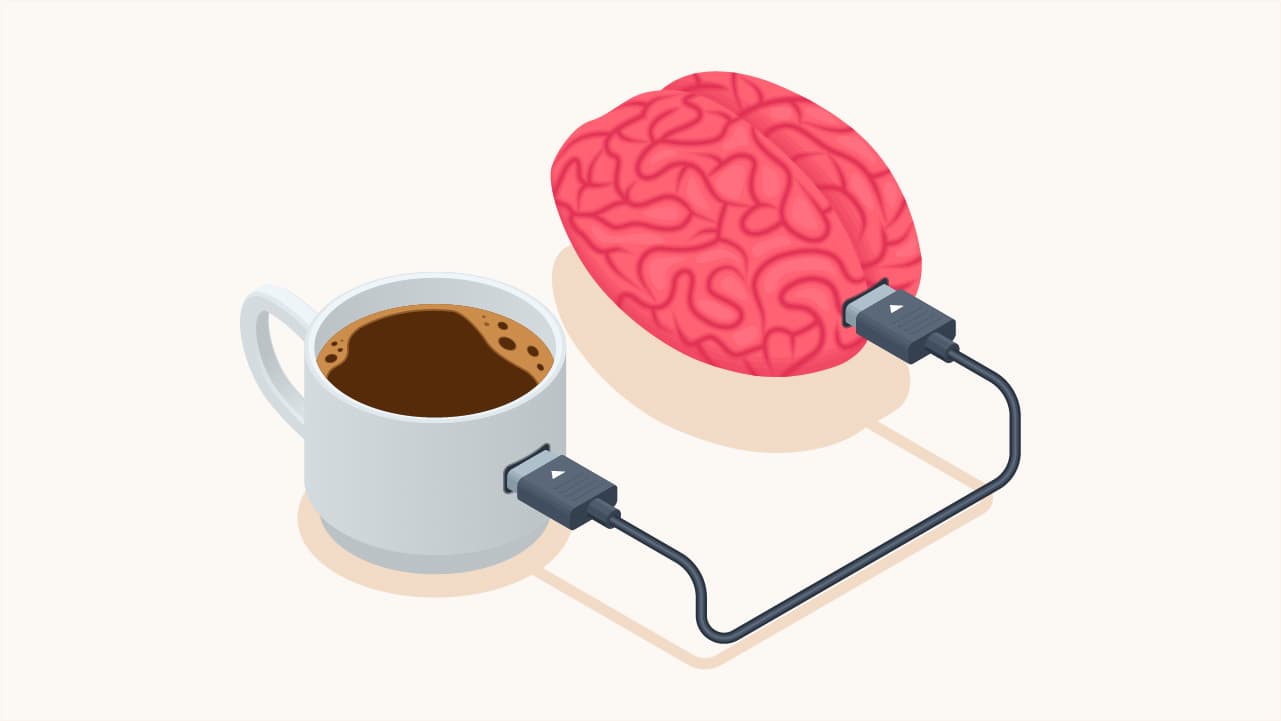
Caffeine is a psychoactive stimulant. Predominantly it affects the brain and central nervous system, temporarily blocking drowsiness to leave us feeling more focussed. In terms of feeling more alert and keeping us awake, it's all down to the effect caffeine has on adenosine.
Adenosine is an inhibitory neurotransmitter. From the moment we wake up, to the moment our heads touch the pillow, adenosine is gradually building. Adenosine promotes relaxation and sleepiness, partly by slowing down brain activity. So, the longer we're awake, the more adenosine we have, and the sleepier we feel.
There are two main receptors for adenosine: the A1 receptor and the A2A receptor. The A1 receptor generally slows down cellular activity and can promote feelings of relaxation and drowsiness. The A2A receptor is more complex, and has a wider range of actions including activating certain brain cells and playing a role in the regulation of blood flow and inflammation.
Caffeine is structurally similar to adenosine, which allows it to bind to the adenosine receptors in the brain. Caffeine hijacks these receptors and blocks them. Preventing adenosine from binding to them and exerting its sleep-promoting effects.
By blocking the action of adenosine, caffeine reduces those feelings of tiredness and drowsiness. Meaning we feel more alert and awake. In addition to blocking adenosine receptors, caffeine also stimulates the release of other neurotransmitters. Such as dopamine and norepinephrine. These neurotransmitters can enhance focus, mood, and cognitive function, giving us the buzz that we all associate with a cup of coffee.
What causes a caffeine crash?
During the time caffeine was active in your system, the production of adenosine didn't stop. So not only are you about to be hit with the pre-caffeine levels of adenosine, but also the additional amounts that have accumulated since that first coffee.
"Suddenly I feel really tired..."
As the caffeine starts to wear off, this build-up of adenosine now has receptors to bind to. Like a dam that's been holding back a river, once the gates are opened, the swell of adenosine rushes to take hold. A 'wave' of tiredness. These feelings of sleepiness and relaxation arrive unannounced, and all at once.
AKA The Crash.

Why do we get hooked on caffeine?
You've seen those office coffee mugs, "I'm sorry for what I said before coffee."
There's a scientific reason for that.
In the short term, as the effects of caffeine wear off, the enhanced release of neurotransmitters like dopamine and norepinephrine also diminishes. This decrease can lead to a drop in mood and alertness. Making us more irritable.
Complete withdrawal from caffeine can cause mild to clinically significant side effects. Headache, fatigue, decreased energy and alertness, irritability and depressed mood are all commonly reported. Typically, symptoms start after 12-24 hours of complete caffeine cessation. But with caffeine having a half life of around 5-6 hours, some of the milder symptoms can be felt earlier. And that's what has us reaching for just one more cup.
If we know the crash is coming, can we be cleverer with our caffeine?
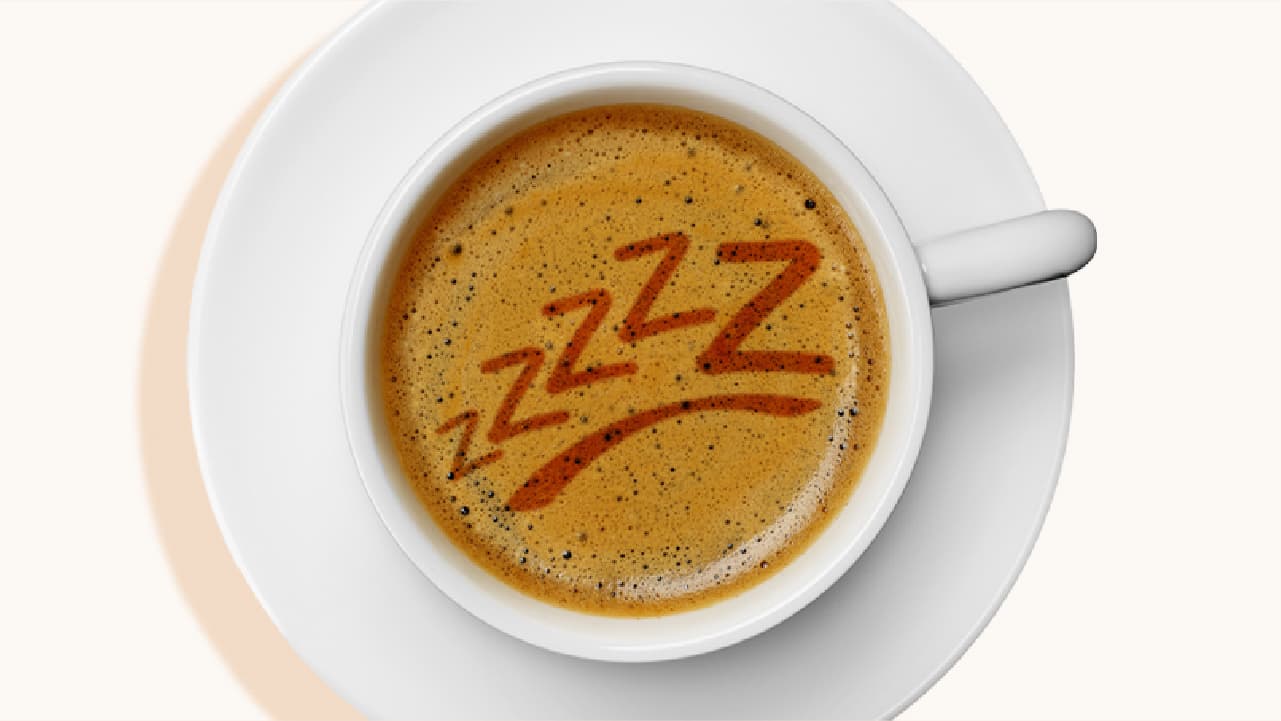
Can I time my crashes to coincide with sleep?
We're familiar with the effects of caffeine on sleep. The two don't mix.
But if we're smart, can we use our body's natural response to make the most of our caffeine cycle? If caffeine levels peak and trough, and in those troughs, adenosine kicks in to make us all sleepy and drowsy, is it more about timing?
Can we hack our caffeine habit?
Sleep and coffee are not best bedfellows. We know that. So, if we still want a decent night's sleep, what time should we be cutting off our caffeine intake?
As a general rule, it's recommended you stop using caffeine no less than 8 hours before bed, and ideally over 10. Which means if you usually go to bed at 10pm, the latest you should have caffeine is 2pm. The only problem with this is, who doesn't need an afternoon pick-me-up?
And so the cycle continues...
But what about those who claim caffeine doesn't affect them? Those baffling friends who shrug nonchalantly while knocking back evening espressos? Who despite downing a coffee at 9, swear they'll get, "A solid 8 hours, no problem."
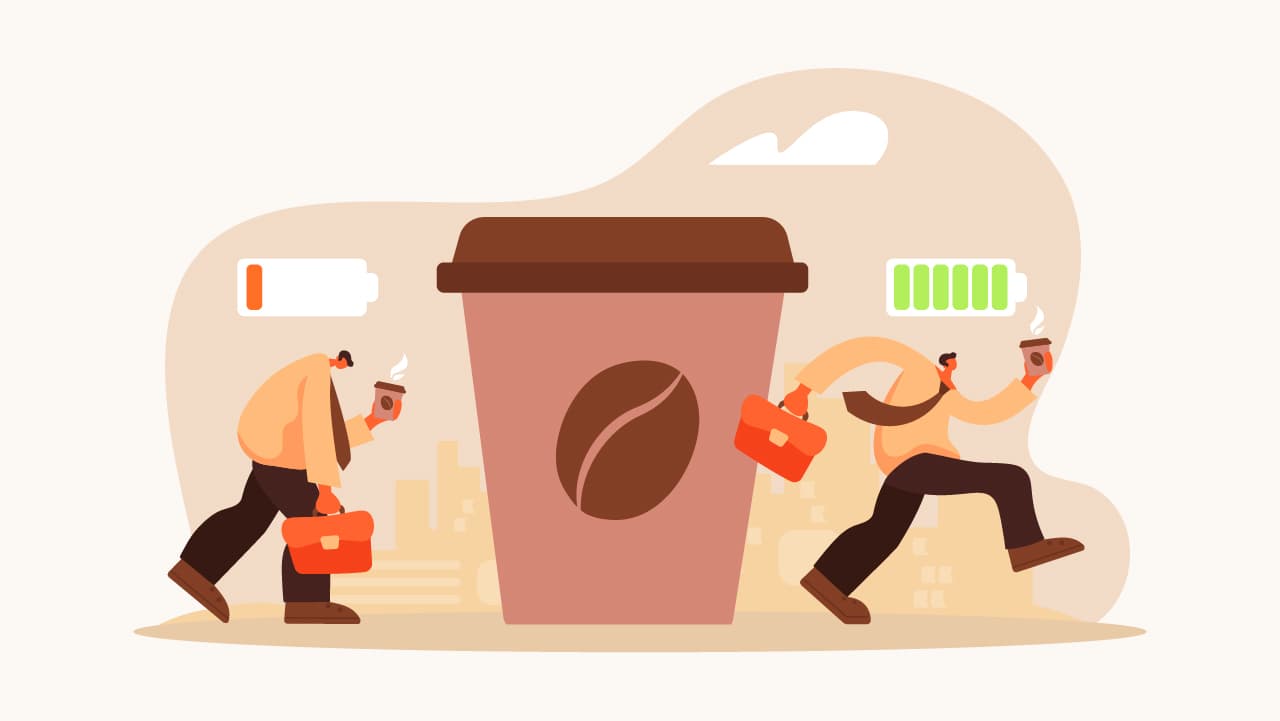
Are some people more affected by caffeine than others?
The answer is yes. And it's partly down to genetics.
Nearly 95% of the caffeine in our bodies is broken down by the CYP1A2 enzyme. We have two copies of this gene, one inherited from each parent. There are two known variants of the CYP1A2 gene. The intuitively named 'slow' variant, and the no-messing, 'fast' variant.
Depending on which ones we inherit, the rate at which we metabolize caffeine varies significantly from person to person. And sometimes, if you've inherited two of the 'fast' variants, you'll be able to break down caffeine almost four times quicker than someone who has just one of the slow variants.
So while some of us are twitching in a corner after just one cup, others can calmly down double espressos all day long.
Thanks Mum.
It's worth mentioning here, that even those who don't feel their sleep is affected, may be experiencing a lesser quality of sleep due to caffeine. A cup of coffee in the evening can decrease the amount of deep NREM sleep by 20-40%. So, whilst those people may fall asleep and stay asleep without any noticeable problems. The lack of quality sleep means they may still wake feeling tired, groggy, and unrestored.
If you're curious to see which one you are, a genetic test can tell you how sensitive you are.
But listen. It's not all bad. In fact caffeine can be pretty legendary too.
Benefits of caffeine.
So far, we've talked about caffeine's addictive nature and the negative side effects that brings. But it stands to reason, like any other addiction - the more we have, the more tolerance we build. And the more tolerance we build, the more our bodies require to get back to that baseline 'normal' feeling. Caffeine's no different. But, when used in the right way, caffeine has many proven benefits for both physical and cognitive performance.
Physical performance enhancement

There's a reason pretty much every pre-workout supplement has caffeine in it.
An overview of 21 studies of caffeine found that caffeine consistently improved athletic performance in endurance sports such as rowing, cycling, running and cross-country skiing.
Caffeine can offer a multitude of benefits when you're working out:
Improved Concentration: By blocking the effects of adenosine, caffeine helps athletes stay mentally sharp. As a stimulant that affects the central nervous system, it increases alertness and reduces the perception of fatigue.
Enhanced Power and Strength: Several studies were reviewed to investigate the impact of caffeine on muscle strength and power, focusing on one-rep max lifts and vertical jump performance. Caffeine was found to enhance upper body muscle strength and overall muscle power, during short-term, high-intensity activities.
Fat Burning: Studies on the effects of caffeine in fat burning (oxidation) showed improvements in fat oxidation by 27%.
Enhanced Thermogenesis: Caffeine can increase thermogenesis, or heat production, potentially benefiting athletes in endurance sports and raising body temperature to help burn more calories.
Dilation of Bronchial Tubes: Caffeine can cause mild dilation of bronchial tubes, which can improve air flow and oxygen uptake, which is particularly beneficial in endurance sports.
According to The International Society of Sports Nutrition, there are some key points to remember when considering the benefits of caffeine on athletic performance:
- The most effective dose is a low to moderate one. 3-6mg per kg of bodyweight.
- Taking a higher dose (9+ mg per kg bodyweight) doesn't produce greater exercise benefits.
When it comes to caffeine, less is more.
Cognitive benefits

Beyond the physical benefits, caffeine has lots of cognitive benefits when consumed in the appropriate doses.
Focus and attention: One of the most notable cognitive benefits of caffeine is its ability to improve focus and attention. Because caffeine acts as an adenosine receptor antagonist, caffeine prevents adenosine from slowing down neural activity, the result is we feel more awake and attentive.
Motivation: Caffeine increases the density and efficacy of dopamine receptors. Often referred to as the "reward neurotransmitter", an increase in dopamine levels is associated with heightened motivation. This boost in dopamine due to caffeine can potentially enhance motivation, making us more driven to get things done.
Memory and learning: A study was carried out by Johns Hopkins University to test the effect of caffeine on memory consolidation. Researchers took over 150 participants who didn't regularly eat or drink caffeinated products and split them into two groups. They were given a series of objects to study, a rubber duck, an office chair, a picnic hamper. Five minutes later the groups were given either a placebo or a 200-milligram caffeine tablet.
24 hours later, the groups were tested on their ability to recognize the images from the previous day's study session. However, some were ever so slightly different. For example, the picnic hamper now had a cloth lining to it. The rubber duck was facing a different way. Subtle changes, but changes nonetheless.
The results showed that the group who were administered caffeine, had better memory of the images they'd been shown the day before. That group picked up on the similar, but not identical objects, and called those out.
Because the participants were not regular caffeine consumers, and only had caffeine after the initial set of images, the results could be attributed to memory. Had they ingested caffeine before the experiment, the results could've been attributed to an increase in focus, concentration, or any other cognitive benefit that caffeine can enhance.
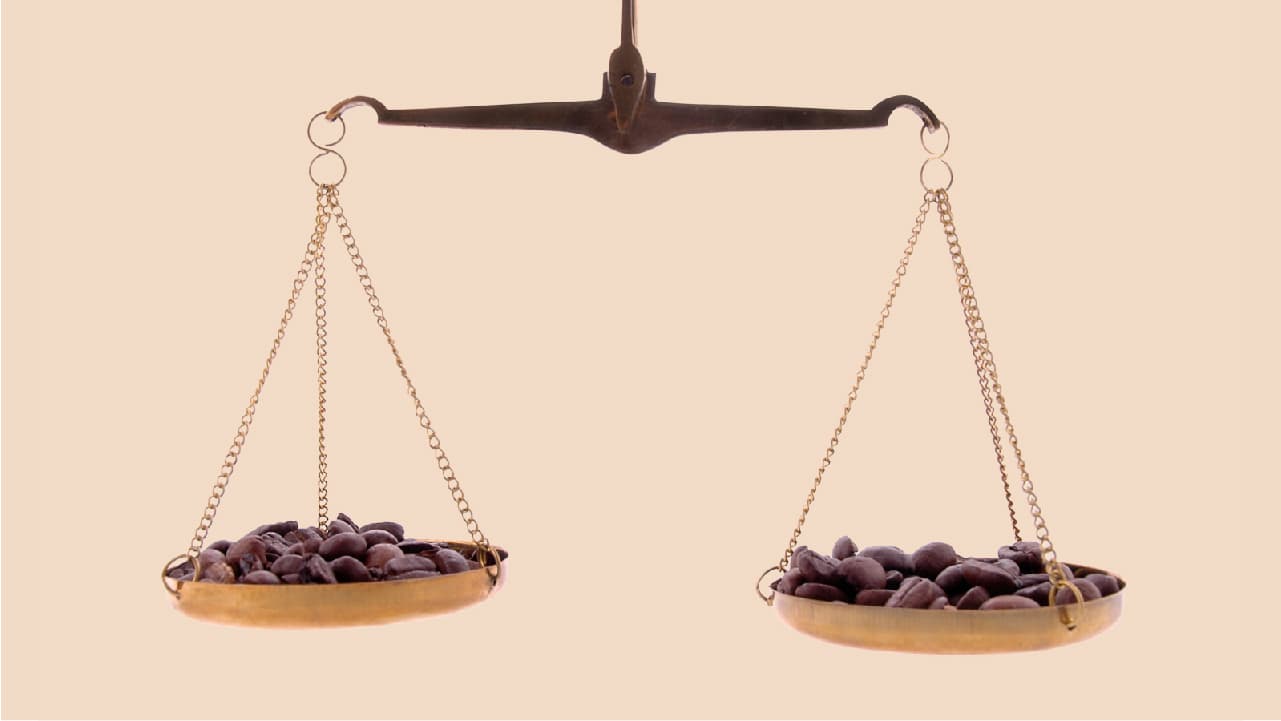
How much caffeine should I have in a day?
Some people will have a higher caffeine tolerance than others. But there are some general guidelines when it comes to caffeine being useful.
The FDA cites 400mg a day as an amount that's safe and generally not associated with any negative side effects. However, the results of the test on memory showed there was an optimal dose. And that was 200mg. Anything above that, participants reported headaches and nausea, whilst anything below that didn't show the same benefits.
In reality, it can range from anything between 100 to 400 mg, depending on your tolerance levels. Low to moderate doses will improve performance, Higher doses run the risk of increasing anxiety, headaches, jitters, and loss of sleep.
The poison is in the dose.
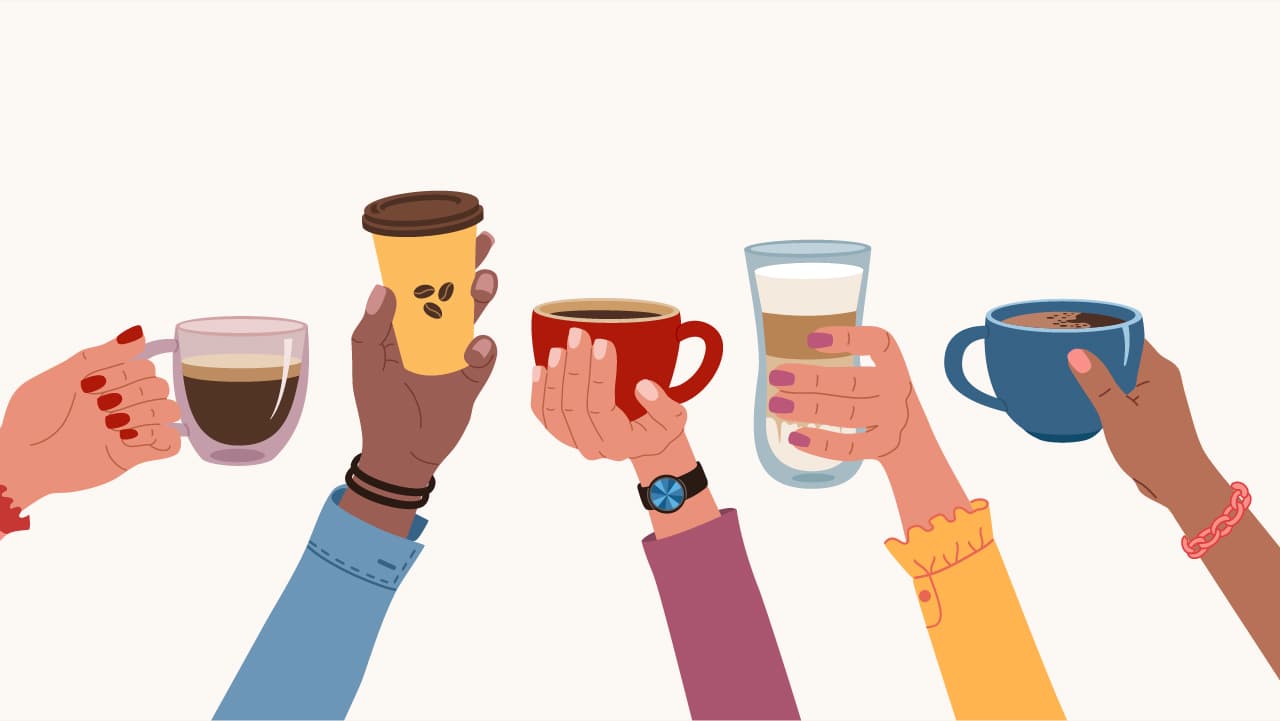
How much caffeine is in your favorite drink?
Caffeine isn't bad for us. In fact it can be really beneficial. It's all about keeping track of how much we're consuming. Which can be tricky. A recent BBC article in the UK showed that some of the big chain coffee houses can have up to 5 times more caffeine in their drinks than others.
If you want to check your levels against the FDA recommended limit, here are the approximate caffeine levels for some common beverages:
Coffee:
Instant (8 oz / 240 ml): 60-80mg
Brewed (8 oz / 240 ml): 95-200 mg
Espresso (1 oz / 30 ml): 63 mg
Tea:
Black tea (8 oz / 240 ml): 40-70 mg
Green tea (8 oz / 240 ml): 20-45 mg
Soft Drinks (12 oz / 355 ml):
Cola: 22-37 mg
Diet Cola: 23-47 mg
Pepsi: 38 mg
Energy Drinks:
Red Bull (8.4 oz / 250 ml): 80 mg
Monster (16 oz / 473 ml): 160 mg
Cocoa and Chocolate Drinks:
Hot Cocoa (8 oz / 240 ml): 5-15 mg
Chocolate milk (8 oz / 240 ml): 2-7 mg
Yerba Maté:
Brewed (8 oz / 240 ml): 30-50 mg
If you're maxing out your caffeine intake every day, then yes perhaps that coffee hitting the spot is simply staving off withdrawal. But if you want to use caffeine as a productivity tool, and tap into its real benefits, then pairing it with L-theanine is the smart way to go.
Caffeine and L-theanine.

L-theanine is an amino acid found in some mushrooms and tea leaves. It has a calming effect on the brain and can help reduce stress and anxiety. Stacking caffeine with L-theanine can counteract the jittery side effects and promote relaxation without feelings of tiredness. Together, caffeine and L-theanine work synergistically to enhance cognitive performance.
How does L-theanine help with brain health and mental performance?
Brain waves
L-theanine has been proven to have a substantial impact on alpha brainwaves. These brainwaves are responsible for increasing mental alertness and arousal, promoting relaxation without causing drowsiness, and even enhancing certain aspects of attention.
Brain chemicals
L-theanine can pass through the blood-brain barrier and provide direct support to brain chemicals that promote relaxation. GABA, dopamine, and serotonin. Additionally, L-theanine also blocks the action of L-glutamate, an excitatory brain chemical that can lead to feelings of stress and agitation.
Brain protection
Drinking tea has been linked to cognitive benefits in older adults. This potential advantage is believed to be due to the presence of neuroprotective compounds found in tea, such as polyphenols and L-theanine.
If you like the way caffeine feels, but don't like the way too much caffeine feels, then swapping out coffee for a caffeine supplement is a great way to get the best of both worlds.
Yep, you can still enjoy your favorite blend, first thing in the morning.
You don't have to cut out coffee completely. It's all about knowing what you're consuming.
The advantage of substituting the odd coffee for a caffeine supplement means you know exactly how much you're ingesting. And if you choose a caffeine pill with a balanced formulation that incorporates L-theanine, you can offset caffeine's negative side effects.
Are caffeine pills safe?
Caffeine pills can be made of natural or synthetic caffeine. Some may also contain fillers, coloring agents, emulsifiers, and other additives. Every pill is different, and the dosage will vary. And unless they're balanced with L-theanine, you'll still experience the crashes and jitters.
If it's the experience of coffee that you're into, most caffeine pills have between 100 and 200mg of caffeine in them. So if the FDA recommends 400mg a day, (which is still a lot!) then that doesn't leave much room for your morning coffee.
Performance Lab® Caffeine 2™ is different.
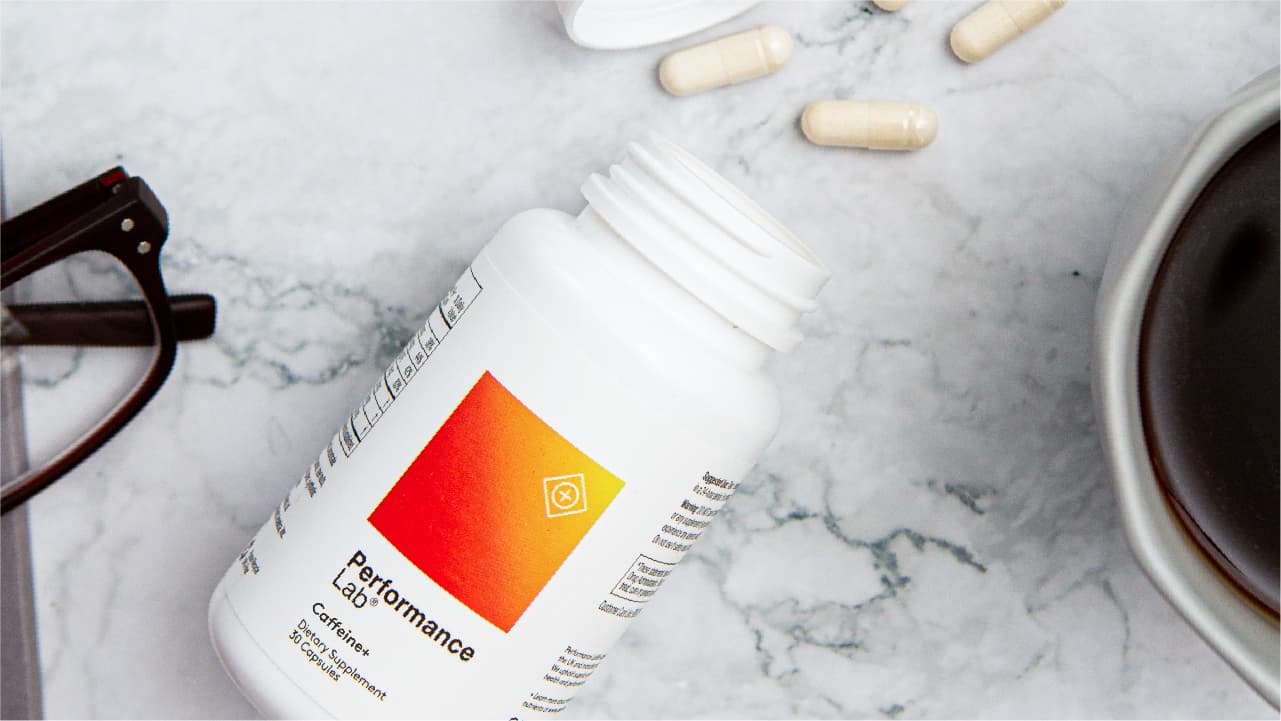
Our advanced formulation features natural caffeine combined with L-theanine, L-tyrosine and NutriGenesis® B-vitamins. Caffeine 2™ provides the energy boost you're after without any risks of side effects. Restorative B-vitamin complex and L-tyrosine help to support healthy cognitive recovery and energy.
Precisely dosed at a sensible but effective 50mg of caffeine per serving, our formulation is based on clinical research. It puts you in control of what you're consuming and allows you to take additional servings if you know you have a higher tolerance.
We also leave out any pointless ingredients. We're Clean Label Project certified. Our NutriCaps® prebiotic capsules contain zero gelatin or cellulose/Hypromellose (HPMC).
Caffeine 2™ starts working in around 15-30 minutes. You'll feel the familiar benefits of caffeine, such as more energy, a clearer mind, improved focus as well as a brighter mood.













